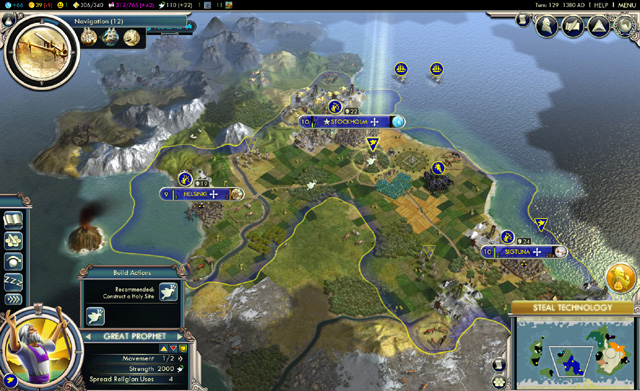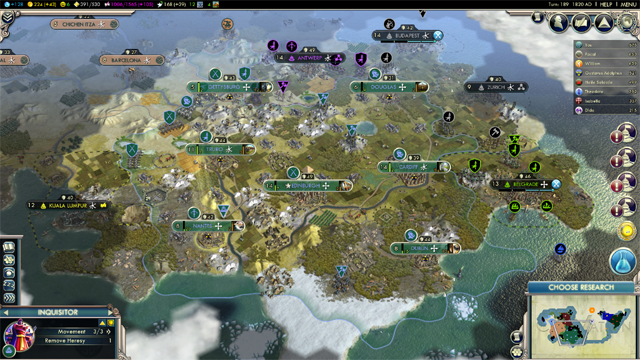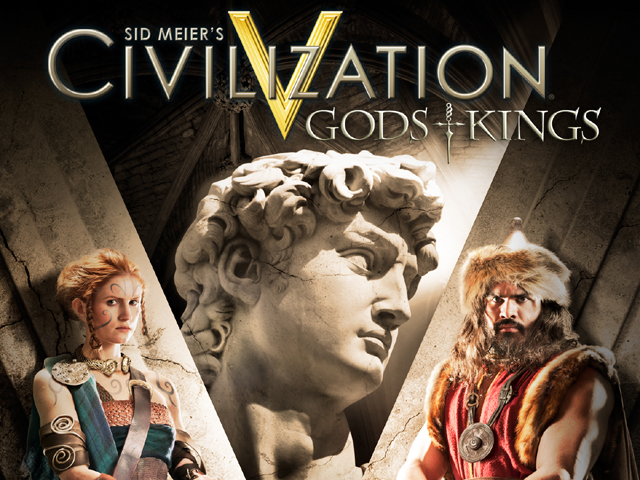Filling in the cracks.
Sitting down and playing Civilization is a lot like meditation; your mind becomes so focused that the outside world fades from existence as the body turns into Jello. Civilization V, with its hexagonal tiles and pleasing visuals, was the equivalent of meditating on top of Mount Fuji. But over a year has passed, issues have presented themselves, and fans of the series have been craving new content. In order to breathe life back into the game, Firaxis Games went on its merry way working on an expansion pack.
The intention of Civilization V: Gods & Kings is to touch up and complete Civilization V through adding a list of new content and features. The first I ran into were the nine new civilizations that bring with them unique units, buildings, and perks. Each new civilization, as with the first game, has its own style and personality. Although a few of the additions are lackluster, especially when compared to the original package’s awesome library, countries such as Maya, Carthage, and the Celts are formidable new additions to the army of choices.
In the early game—mostly pre-renaissance era—religion is a sparkling new feature. Early on I was able to create my own religion, which I promptly named Jonnyanity, with perks of my choice. A few of the perks are reliant on the prosperity of the religion, so for a few thousand years I was battling to convert people to Jonnyanity, including my own people who somehow thought Confucianism was more attractive. Since I had trouble keeping my own population in check I missed out on the opportunity for additional culture and happiness which would have helped tremendously down the road.
In order to promote my religion, and in-turn reap spoils, I was encouraged to send out missionaries and inquisitors. Each costs faith, which is generated over time through several means, and is capable of popularizing a religion both domestically or abroad. My religion never grew too much, but after seeing the neighboring Mayans send their missionaries at my capital for a few hundred years, I grew tired of it and sent in some cavalry to declare holy war. I’d like to think they learned their lesson.

Toward the mid-game, religion faded into cultural insignificance, but that’s when espionage snuck up on me. Espionage allows for a variety of options that result in providing stolen technology, city-state influence, and important intelligence about the intentions of other civilizations. Balancing offensive and defensive operations is the key to success as other countries have spies of their own. While espionage adds a layer of strategy, it’s completely done through menus so it felt more like I was playing a Facebook game than engaging within the game’s otherwise lively environment.
In addition, there are three new scenarios, a couple of which are familiar returns from previous Civilization games, with one titled “Empires of the Smoky Skies” being extremely interesting. This particular scenario includes unique units and texture designs that give it a Victorian steampunk flavor, and despite how that sounds you can tell that quite a bit of work was put into it. It’s a unique take on the formula and feels wildly different than the conventional approach. That said, most of the appeal of Civilization is to play on random maps and build up a country from the gound up, so I fear that—like me—most people won’t bother. It’s still a nice touch, though.
Then there are the little things that Firaxis have packaged into the mix. The AI no longer suffers from a case of schizophrenia and makes more rational decisions. The technology tree is much improved with a better sense of direction and some additions, especially toward the late game where the Modern Era and Future Era have been almost completely re-designed and are now named Atomic Era and Information Era. You can find things like the Bomb Shelter and Hubble Space Telescope that help make the last turns as interesting as possible. There have also been some improvements to naval warfare which make playing on an ocean-rich level far more satisfying.

My biggest disappointment with Civilization V: Gods & Kings lies in the fact that many of the original game’s issues have gone unaddressed. Shallow diplomacy, a questionable one unit per tile design that even the AI can’t handle, poor performance, wasteful bonus resources, and global happiness which leads to a void of micromanagement were all still here to greet me. Even more stifling, militaristic domination is still the backbone of success, so playing through several times doesn’t yield as many results as I hoped.
Civilization V: Gods & Kings improves the original experience with new content and balance, but the package lacks any major features that make it feel like an expansion rather than content DLC. New civilizations and units give the game some new flavor while religion adds a layer of strategy to make “dead turns” less common, but that’s just the thing. You’re still going to see most of the same problems that kept Civilization V from being the exemplary title that the series has been waiting for.
The sum is an expansion that adds a lot of little things that make the game feel a bit nicer and shinier, but culminate into the same overall experience. It simply isn’t enough to warrant its price tag unless you’re a hardcore fan looking for some extras to chew on.
-
Religion spices up the early game.
-
Espionage is too menu-driven.
-
New civilizations, units, and buildings add personality.
-
Neat adjustments finally fill in the cracks.
-
Lack of major additions and/or improvements make it feel like the same game.







